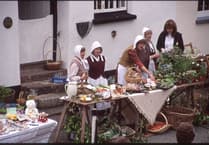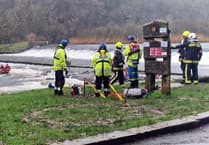This week, the Times explores the role of a St Luke's occupational therapist, and the part they play in providing specialist end of life care.
FOR those of us who may never have had contact with an occupational therapist, our understanding may be limited.
Others may be under the misconception that this profession just provides medical equipment. This is far from the truth, as St Luke's specialist occupational therapist, Shaen Milward explains: 'We are professionals who optimise people's ability to undertake everyday activities, relating to independence, self care and leisure; we achieve this through adaptive practices (doing things differently), equipment and often with a psychological perspective.'
With St Luke's embracing a 'hospice without walls' approach, Shaen works across a variety of settings, caring for patients at home and in the hospice based at Turnchapel; the OT team supports St Luke's crisis team and supports wider care teams across the community, such as district nurses.
To deliver this care, Shaen will find himself travelling across a vast geographical area, across Dartmoor, West Devon and into South East Cornwall, in addition to Plymouth and the South Hams, contributing to the 48,000 miles the community care team travelled last year.
St Luke's have invested in 'in-house' occupational therapy and physiotherapy as opposed to using services outside the organisation for many reasons.
Shaen said: 'What sets us apart from other non-specialist occupational therapists is that we are able to respond really quickly, when people need us most.
'We work with patients with life-limiting illnesses all the time; we often know what might work best, or use an approach which is more sympathetic, to client and carers' needs. Timely support, and a specialist perspective is essential.
'We always look at adaptive practices (changing the way things are done) before introducing a piece of equipment.
'We ask ourselves "How can we advise and help adapt the way this task is done so we don't have to use equipment at all?"
'Our mantra is always "less is best"!'
For an occupational therapist there is a time when equipment is the only option, but it is the process in making this decision that is important for Shaen: 'We do issue a lot of equipment; there are times where it is not possible to overcome a problem without this approach.
'We can help with so much, but some examples include accessing electric powered wheelchairs, putting ramping in place and accessing specialist seating.
'Having said that, we assess for small adaptations too, such as chair raisers; simple things can make such a difference.
'Just raising a chair by a couple of inches can make the difference between a patient who needs lots of help to stand and being able to do this without any assistance. I get lots of satisfaction from simple fixes!
'We always consider the palliative care perspective. Equipment can be very symbolic of a patient's health deteriorating. For example, a hoist can be pretty imposing and very difficult for the patient to come to terms with.
'In many settings an occupational therapist or physiotherapist may be working toward rehabilitation goals, whereas at St Luke's, we are working with people at the end of life.
'We want to optimise function and get patients to a stage where they can be as independent as possible; quite often we are not working with a traditional rehabilitation framework, but focusing on palliative rehabilitation to add quality to the life that is left.'
Shaen said the team deals wth some highly challenging patient groups, which represent challenges in terms of keeping people safe, independent and cared for in their choice of location.
'A person with a glioblastoma (brain tumour) presents challenges that other occupational therapists may not come across regularly.
'A St Luke's specialist therapist will come across many patients with this diagnosis, so we become more confident with symptoms and presentation; we learn what works well and are able to advise clients, carers and other health professionals.
'Sometimes it's not about what you do, but about what you don't do, and what is best for the patient and family in that scenario.'
Shaen gave an example of specialist support: 'For patients with brain tumours, often cognition is compromised, meaning patients can really struggle with new learning, therefore introducing a new piece of equipment, such as a walking stick, could make things more dangerous, because it is so different from what that person has done for the past 40 or 50 years.
'So once again, it is about other ways of offering support rather than the obvious, traditional things.'
Shaen talks passionately about his work around breathlessness management — this once again reinforces the specialist skills an occupational therapist can offer to a St Luke's patient.
Breathlessness management is about techniques and ways of managing breathlessness. Shaen said: 'Some of our patients with pulmonary fibrosis, COPD or lung cancer really struggle with feelings of not been able to catch their breath and often panic when they start to lose the ability to breathe.
'What we are able to do is teach practical skills around self-management, promoting patient empowerment.
'We use the Cambridge Breathlessness Intervention Service model; this enables us to teach patients tools and techniques to manage breathlessness, like posture, where patients breathe from, and recovery techniques.
'We also teach the use of hand-held fans, as there is extensive evidence based around having a flow of cool air over your mouth/nose area.
'This technique can actually reduce the feeling of being breathless, giving patents some level of control over their symptoms.
'We are able to pull all these things together and give patients something really practical in order for them to self manage their breathlessness and not rely solely on medication.'
In a brief snapshot of the role of a St Luke's occupational therapist, it is clear to see the important role they play alongside other clinical professionals at St Lukes.
They enable patients to be pain free and have a better quality of life in those final months, weeks and days.
What is perhaps not often considered is when you fundraise for St Luke's Hospice Plymouth, you are providing much more than a doctor or nurse to someone in need.



